I always love doing vocal work on the day we read Joan Schenkar’s The Universal Wolf. There are so many juicy lines to choose from. Today’s choice: “Every Pleasure has its Penalties.” We did some work on this one sounding like sweeping brooms. There were both corn brooms (that’s what they’re called, I looked it up) and push brooms being used, we checked. Then we worked on sounding like axes chopping wood – another nod to The Universal Wolf in which the woodsman is spoken of but never appears. Then just for fun we did chainsaws again. Chainsaw speaking is fun.
After our warm ups we perpetrated some gibberish wars. In this game two people have a conversation in gibberish and gesture, but every thing they say and do is repeated by a group of others standing just behind them. The result looks like some sort of ritualized tribal standoff. This one is really fun and we’ve found ways to incorporate it into our performances in the past. We also did some mask work – using only our faces as the masks! We began with the usual dominating and submissive masks of Boal’s suggestion but we had extra time (gasp.)
So then we also tried masks of joy and despair. The super creepy thing was that as the joy and despair characters tried to find ways to interact with each other these dynamics seemed to be even more dominating than the previous ones as most of the despair characters just wanted to be left alone and the joy characters were trying to cheer them up.
It was unsettling, to say the least, but very interesting. We also managed to squeeze in some Pineapple Umbrella, which is really just shaping with an added element of words to be incorporated and also recall of shapes associated with the words. I believe our most oft repeated shapes this year were “pudding spoon” and “Katy Perry Klingon” with some “concrete balloons,” “eggplant photosynthesis,” and “coca cola ebolas” thrown in there too. This year we also asked them to add sounds for a couple of shapes. I’ve told you they’re good sounders, right?
Our first reading was Boogie Woogie Landscapes by notzake shange. Shange uses poetry, song, and dance to tell an imagined autobiography. The main character, Layla, returns home from the disco and imagines “night life companions” that flow in and out of the walls telling bit of stories and memories “attempting to refine Layla’s perceptions of herself and her past.” Layla either embraces their attempts and participates in the reminiscences and revelations or, when things get difficult, she rejects them by dancing and singing the repeated phrase “dontcha wanna be music and ease into fog.” Shange’s mix of fluid poetry and storytelling is hypnotic, trance journey. The language of the poetry is beautiful and evocative. Most years this piece is in the reader it gets chosen as a style in which to write one of our new plays. Will the same happen this year? Based on the reactions of the participants in our discussion they felt the pull of this piece just as much as those who have gone before them. Shange has clearly tapped into a deep universal desire here. Yes, we all “wanna be music n ease on into the fog/ like rain & sun/like daybreak”
Our second reading was of The Universal Wolf by Joan Schenkar. Schenkar’s razor sharp wit is employed in telling the story of Little Red Riding Hood, but also in skewering structuralist and post structuralist interpretations as being about as useful in the face of primitive hunger as a mother’s instructions to stay on the path. Each character announces to the audience their intentions to tell the story as the audience SHOULD know it – their OWN story. But no character is ever allowed to be entirely in control, so conflicting narratives collide in ways that confound the characters. The real driving force here is hunger and the play is full of bloody imagery and talk of meat and drink. Grandma is a hardened retired butcher who tricks the wolf into getting into the armoire where Little Red awaits with an axe to “deconstruct” him. The end is audacious and shocking but cleaves completely to Schenkar’s vision of the violence our primitive hungry selves are capable of. I won’t give it away, let’s say another deconstruction occurs. The final image is of a confounded Roland Barthes driving a laundry truck around the aftermath in circles. No tidy, easily addressed mess to be put in the hamper here!
After the reading we did Boal’s weight exercise. This is a nice companion to the slow motion race we always do. In this exercise the participants are asked to simply move in a circle, but keeping the circle moving becomes more and more difficult as they are asked to imagine a stone ceiling that slowly descends towards the floor until they can barely scoot along in the space beneath it. It’s intense, but don’t worry, the ceiling always goes back up again.
After a little hooking into the group hive mind with a one note orchestra we went on to play a little of Boal’s domination game.
We had plenty of time so we got to play in pairs with one person leading another around with the palm of their hand, then in groups of five with four people being led by the hands and feet of a person, and then finally with the whole group in a web of domination that spread out from one person in the middle controlling two people who are each controlling two people, who are each controlling two people and so on. Domination mountain we have dubbed this last one and it is no easy task, but after a couple of attempts they were successful. So much progress in such a short amount of time makes my job easy!
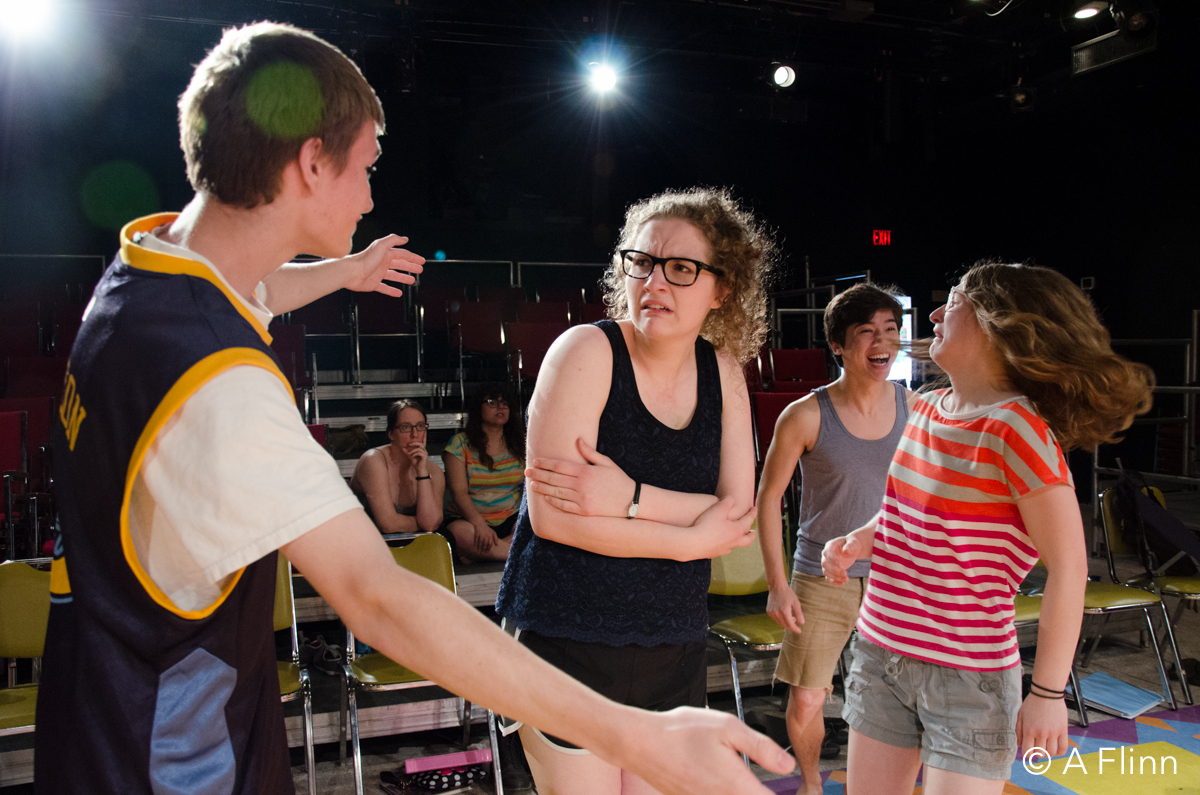
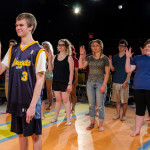
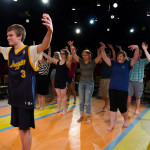
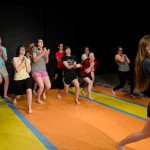
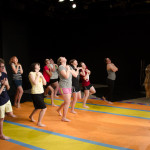
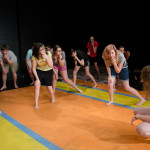
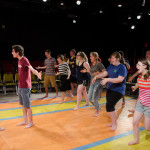
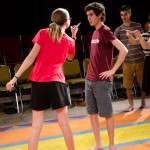
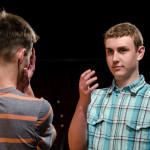
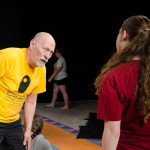
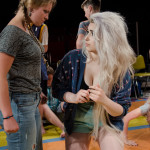
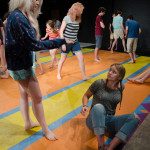
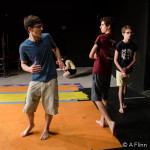
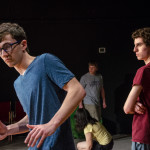
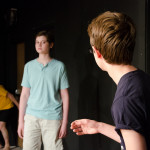
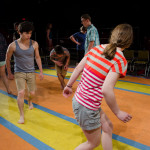
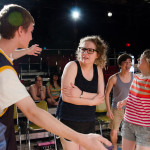

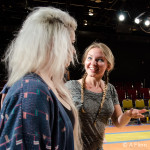
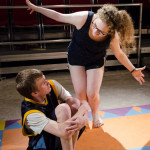
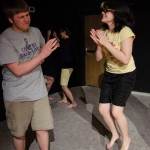
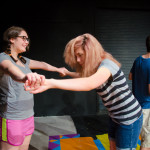
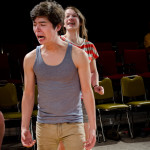
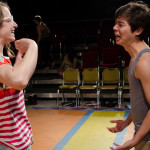
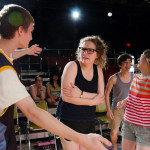
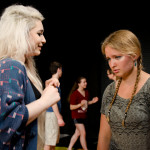
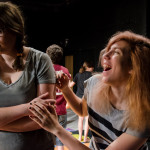
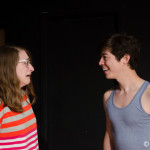
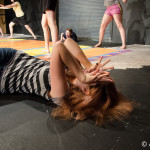
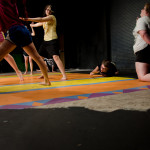
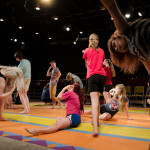
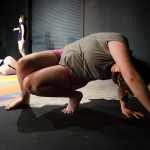
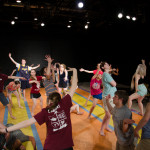
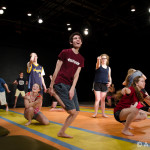
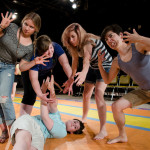
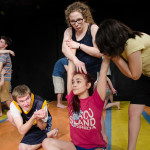
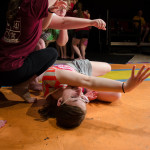
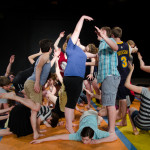
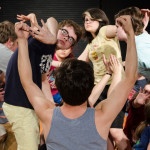
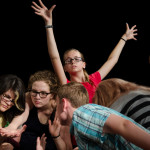
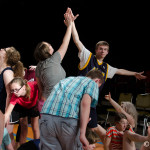
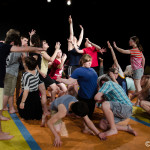
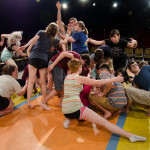
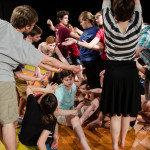
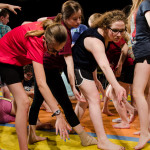
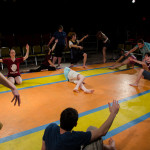
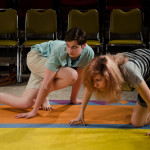
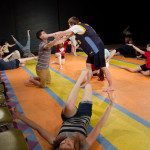
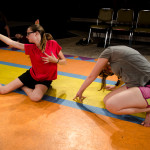
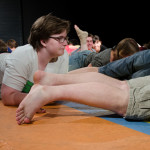
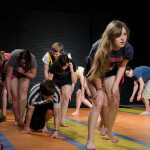
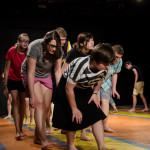
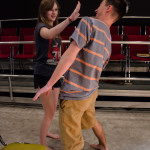
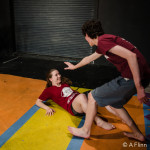
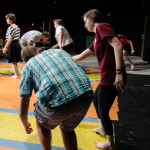
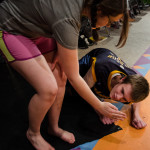
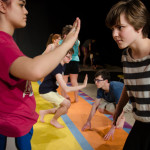
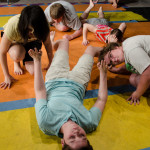
Leave a Reply
You must be logged in to post a comment.